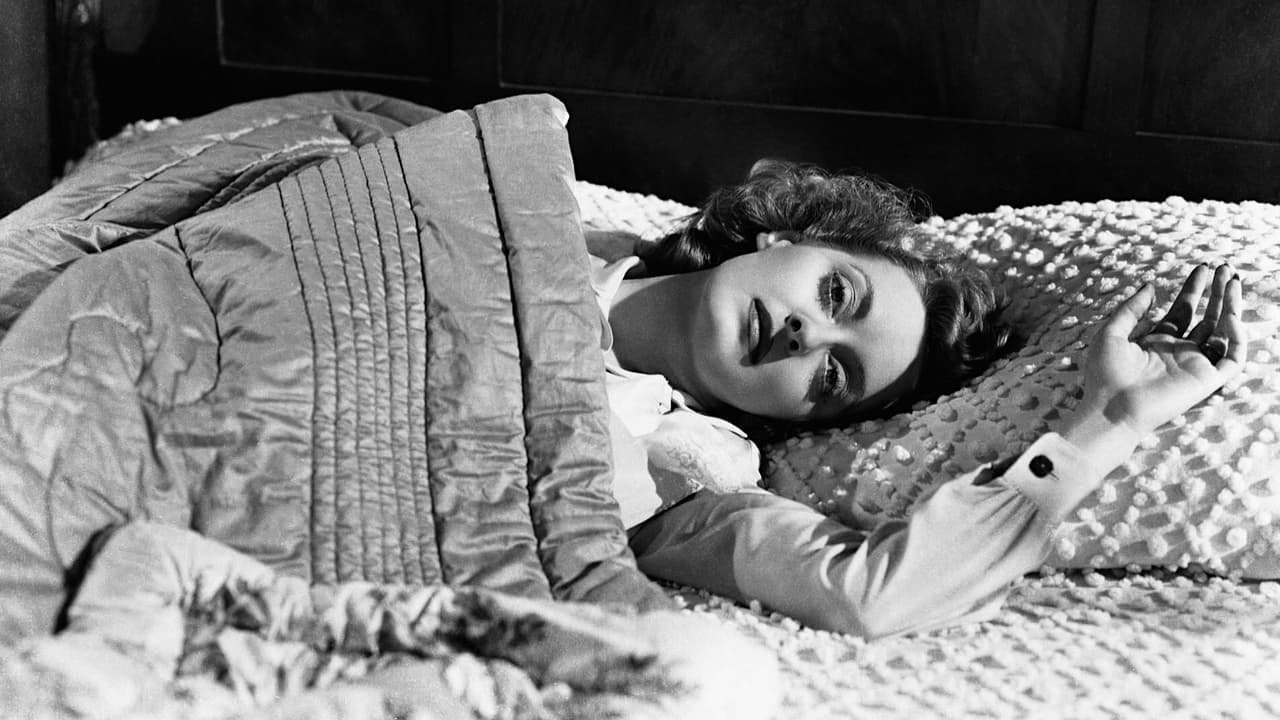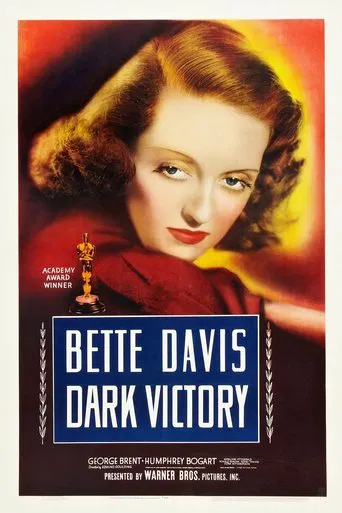

She didn't do it for every performance (only most of them, you know), but when she had to Bette Davis could bring a certain high-electrical charge to a character that would make a movie more dramatic. It's there in Dark Victory, and she finds with the character of Judith moments to make that energy go really up, and then other moments to tone it down a little more - in a sense this is a performance that is great because of her fluctuating energy levels, if that makes sense. For example, her character discovers, as does happen sometimes (or only most of the time) in such dramas, about what her condition really is by doing just a little bit of digging - her file is on the desk that Dr. Steele happened to leave behind while things are being packed away - and she sees "Prognosis Negative." Just in case we don't notice that enough, the director helpfully takes those words and blows them up.She has a confrontation with Dr. Steele, who she's growing to like a lot before this and he may be falling in love with her too, but it's not an immediate "How could you!?" type of scene; she's out for a night at the club with Steele (Brent) and her friend Ann (Fitzgerald), and she's being a bit uncharacteristically nasty in front of them. Judith's shown up till now she can be a little fiery and direct when talking to people - it's the Bette Davis way, from a number of her characters, just the way she talks and looks at people - but this emotion is different, how she has sarcastic comments and snide remarks as they're looking at the menu for what to eat. She picks hers up and goes (and I'm paraphrasing here), "Ah, shall we have some 'Prognosis Negative'!) And then the cat's out of the bag and things click for the other characters, but this whole scene is indicative of what Davis could do so strongly - we feel angry for her that she's been lied to (though one might understand on the other hand trying to hide the 'There's nothing we can do' sort of melodramatic news involving a medical condition, as Judith has). It's everything behind Davis's FORCE as an actress that does it in that and other scenes here.What's also good about Dark Victory is that Davis gets to show vulnerabilities as well, mostly in the last section as her condition starts to worsen (come on, I don't think I'm giving anything away as far as the plot goes, what's to discover here is the emotional range of things), and her strange going-blind-in-one/both-eyes-brain-falling-apart disease makes her rely on others, but she's not doing it so much that it becomes maudlin. We also come to believe the romance between the two and not simply in that 'you're dying, I'll care for you, etc' sort of way from the doctor, though that's there; I can sense the connection between the actors (Brent I think was a typical contract player for the time, and really this is Davis's show so everyone else are just that, including Bogart and Reagan), and they have good chemistry.Does it get melodramatic? Oh, you bet your life it does. This is meant to draw the tears out, whether you're a woman who's seen it many, many times, or the man who got dragged along (though maybe he wants to see it too) to see the high dramatics unfold. But the writing of it is clever to dole out the details gradually, that the inciting incident, of Judith having the "WTF" moment as she's riding her horse, is startling and harsh, but how characters discover things and then find them out (again, that folder-file scene, and the confrontation after) is told like... well, one of these kinds of stories should be. It's before this sort of tale got over-used and over-wrought (Love Story, I'm sure, is a relative of this even distantly). It's all about Davis though, at least for the most part.And yet, I don't know if it's entirely a *great* movie unto itself, even as Davis surely is; Bogart plays the "Irish Brogue" and his accent goes in and out, so while he tries he's kind of a weak spot in the story for me, as the stable hand who may have feelings for Judith as well; Regan may actually be okay here since he's just playing a drunk playboy, but even at that he's not terribly convincing; there are some scenes here and there in the first half where it could use a little tightening, and it's really halfway through where the writing gets tighter still. But there's a lot to like about Dark Victory, as it understands what movie it's got to be and manages to get a lot out of the audience.At the heart of it is Davis and Judith, that woman who will look on at this as a 'victory against the dark.' It's almost inspirational, if one can see something like that out of a situation as grim as a dying with dignity, or if that's what it even is. 8.5/10
... View MoreThis was one of Bette Davis' most famous performances, although she made many and all were outstanding. Still, this one stands out from the others as exceptionally personal in a way that she never again quite found an opportunity to bring out. Helping her in this were all the ingredients, a fantastic script, a great score by Max Steiner, her cavaliers George Brent, Humphrey Bogart and Ronald Reagan (always drunk and silly, he is the only one in the film to get socked,) and Geraldine Fitzgerald as the most important supporting actress with her display of a high level of sensitivity. This is a film that never will age, anyone can learn much of it in whatever age, for its vital argument about death and life. while at the same time it's a major lesson in empathy. This is brought out in them all, George Brent as her doctor of great psychological insight, Humphrey Bogart as the faithful stable groom, (the most intense love scene is actually in the stables between him and Bette,) and perhaps most of all in Geraldine Fitzgerald as her closest friend.But Bette Davis is the marvel above all. Her acting is almost excruciatingly truthful in her more than convincing way of taking on her destiny. It's interesting to compare this film with the almost contemporary "The Light that Failed" with Ronald Colman as an artist going blind, that is more tragic, while Bette Davis actually makes a glorious victory of her fate.
... View MoreIn terms of best male actor of all time, for me it's a tie between Spencer Tracy and Cary Grant. For best female actor, no question in my mind -- Bette Davis. And her talents are well displayed in this, which was said to be her favorite film.I want to start out by saying that if you already have the DVD, I don't recommend updating to the Blu Ray version. I'm not sure there's significant improvement.This film is another of the famous pairings of Bette Davis and George Brent. I actually think this is one of the better ones because there's more of a story to Brent's character here than sometimes occurred. He's a doctor with some expertise in brain problems, who is about to go off on medical research. He is persuaded to postpone his trip to look after Bette Davis' spoiled rich girl character, who is having symptoms of dizziness, headaches, and double vision. Early in the film it's almost impossible to have much sympathy for her character. But, we also know that some of her impertinent behavior is a result of her fear. My sympathy for the character began when she received the diagnosis -- I've been there, done that, although in my case both times it was good news...which was not expected. But the fear was immense while waiting for the prognosis.There are several supporting actors worth mentioning. Geraldine Fitzgerald is very good as the best friend. Humphrey Bogart has an odd role as a stable man with an Irish accent. The role is often criticized, but this was back when he was still a supporting actor; he was paying his dues to the studio here. Ronald Reagan has a nothing role as a slightly tipsy friend; I can't believe it helped his career. Henry Travers is good (as always) as the country doctor who persuades George Brent to take Davis' case.A major portion of the film is the love conquers all stuff...although, of course, in this case it doesn't. But it is a good example of how people can sometimes fool themselves about the future.The death scene in remarkably well done from an emotional standpoint. In my view, one of the great moments in film.The one part of the film that just doesn't work for me is Humphrey Bogart's main scene. To me it just doesn't work. Not because of the character's Irish accent, but just because it seems inane. I think the problem with the scene is that the groundwork of it is not laid, and then Bogart tries to seduce Davis, not knowing that she is dying. I think it's the one significant flaw in the film. Well, other than Ronald Reagan's empty performance.One of the bonuses on the Blu Ray edition is a short documentary sort of lamenting that this film, or Bette's performance did not win the Academy Award. However, the year was 1939, the year often considered the year that the finest films in Hollywood's history were made, including "Gone With The Wind". "Dark Victory" is a wonderful film and Bette Davis' performance is memorable. But neither the film nor the performance could complete with "GWTW" or "The Wizard Of Oz", or several others.Even despite the fact that Davis is my favorite actress, this film was very memorable to me. When I decided to upgrade to Blu Ray (a waste), I delayed ordering this film because I was expecting a bad diagnosis, It was only after the green light that I had the nerve to order the film. The death scene is that memorable.
... View MoreThis is a great movie because it avoids sentimentality and because of the performance by Bette Davis in what has to be one of the best roles of her career. Ms. Davis completely dominates the movie and because of her the movie avoids becoming hokey or corny. Her performance is superb and she carries the movie. The story itself is strong and compelling and deals candidly with many sensitive themes. The plot is highly dramatic but avoids becoming melodramatic as Ms. Davis' character, Judith, struggles to come to terms with serious issues relating to life and death. The movie is filmed in a film-noir style that predates the emergence of that genre by several years. George Brent and Geraldine Fitzgerald are also give wonderful performances in supporting roles, and they are supportive roles because this film has one star and that star is Bette Davis.
... View More